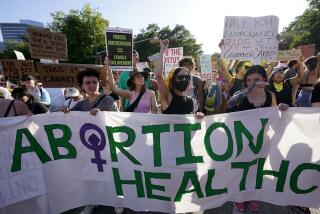CLIPBOARD : CCAP (Coalition for Children, Adolescents & Parents)
- Share via
The United States now leads all other developed nations of the world in rates of teen-age pregnancy, abortions and child-bearing among teen-agers.
In Orange County (1989), 4,153 babies were born to adolescents age 19 and younger. Sixty-nine of these babies were born to mothers ages 10 to 14; 1,300 babies were born to mothers ages 15 to 17.
The Orange County Coalition for Children, Adolescents & Parents started working 12 years ago toward preventing unintended adolescent pregnancies. That work spread into such related areas as child abuse, school dropouts, drug and alcohol abuse, suicides, gangs, racism, violence (both domestic and community) and multicultural conflicts.
The group provides adolescent programs in schools, group homes and jails; gives seminars offering parents chances to improve their ability to communicate effectively with their children, and trains teachers, therapists, counselors, youth-servers, clergy members and others as counselors in family-life education.
The adolescent programs include the subjects of anatomy and physiology, relationships, the responsibility of being a parent, birth control, sexually transmitted diseases, AIDS and “what’s love got to do with it?”
In a seminar for freshmen and sophomores in high school, some questions submitted by youngsters anonymously for discussion involved sex and their self-doubts:
* “I am 15 and have not kissed, had sex or gone out with a boy. All my friends bother me about it and want to set me up. Why is it so important? I’m not ready.”
* “If I get an abortion, am I a bad person?”
* “How come guys want to have sex with girls, but then they call them sluts? And if the girls want to wait, they are dumb and the boys spread rumors?”
Other questions were more tragic, about rape and pregnancy: “I was raped and I want to have an abortion, but I don’t want my parents to know. What can I do? Please help.”
The message the CCAP counselors convey is abstinence, that no one needs to become sexually active and conceive a baby before being ready. Don’t jump into sexual activity, they say, until asking: Are you ready? How do you know you’re in love? And a cautionary note: Don’t leap into sexual intimacy to fill a loneliness, a void that exists from not having parents available.
“Sex is never an emergency and pregnancy is no accident,” is how CCAP Executive Director Cynthia Scheinberg puts it.
The other message from counselors is subordinated: If you choose to have sex, use contraception. National statistics show that at least 50% of adolescents will experiment with sex by the end of high school.
Beyond the programs for teen-agers are the seminars that CCAP provides for parents, with guidance on how to handle adolescents. CCAP’s educators tell parents that a child of 14 or 15 should understand clearly the physical nature of sex and should also have a little clearer picture of the emotional nature of relationships.
“It’s a scary time for parents” as their children approach adolescence, Scheinberg said.
Parental cooperation is essential. Last year parental classes, including 2,600 participants, were conducted in English, Spanish and Cambodian.
CCAP also trains professionals in parenting education and even in discussing the prevention of behaviors that transmit AIDS.
“We’re walking a tightrope,” Scheinberg said. “This is not in a county that has a consensus” on how to handle sex education.
But actually, she said, “rarely do kids get pulled from the (sex education classes)” by parents. Hours: 8:30 a.m. to 5 p.m., Monday through Friday Address: 822 Town & Country Drive, Orange Telephone: (714) 972-4859 Miscellaneous Information: CCAP loans videos and up-to-date films that parents and children can watch and discuss together.
More to Read
Sign up for Essential California
The most important California stories and recommendations in your inbox every morning.
You may occasionally receive promotional content from the Los Angeles Times.













